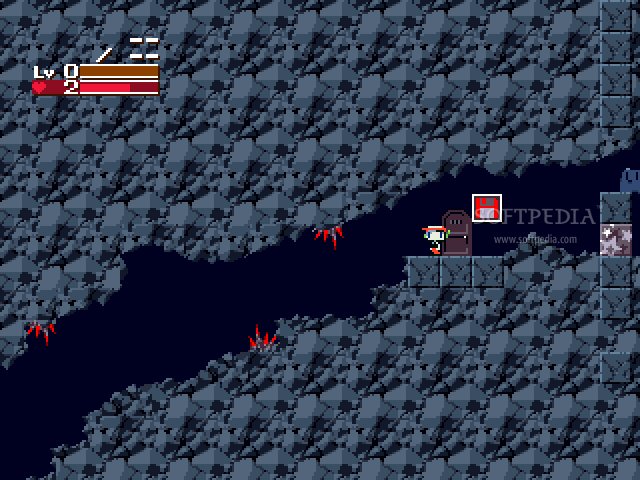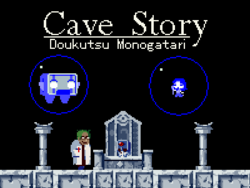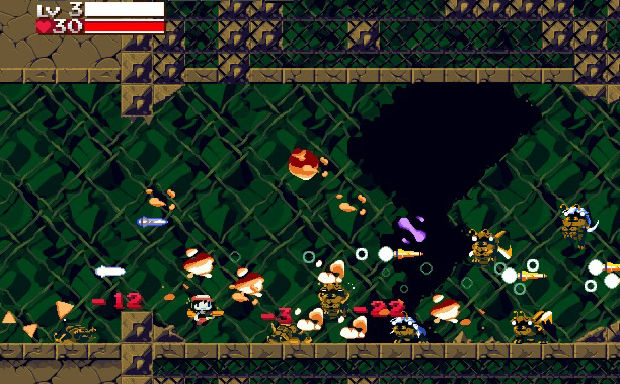Last updated on March 4, 2013
I think I’ll take a break from all Mana, all the time for today. Sorry about the bouncing around of scheduling and the like, but I will finish this Mana series if it kills me and get that List entry out. However, something pressing and interesting came up, and I just can’t help but talk about it.
I completed Cave Story + last night. Other than knowing that the game strikes a Metroidvania style, all I knew from the game were a few reviews. First, Tim Rogers’ overly glowing, and probably slightly insane, review was my first encounter with the thing. Not that I played it after reading, but he did make it seem excessively interesting, moreso than it actually is (more on that later). Alex Kierkegaard (of Insomnia.ac, or culture.vg fame or infamy, depending) had a much more negative review, detailing the obvious aesthetic precision that went into the game’s one man passion project vibe, but also noting its graspings at greatness fell far short of the “rest of the history of video games”.
Who’s right? Who’s wrong? I’d say to go for the neutral ground in this case. The music is pretty good at emulating the style of old NES games; nothing revolutionary, but competent nonetheless. But am I going to prefer this to Mega Man chiptune? Probably not. As far as graphics go, the game is pretty ugly. All the sprite work in the world isn’t going to cut it if the environments aren’t interesting, and they are not. All I could note was how everything struck some earth-tone shade through the whole game except for the characters – I imagine this was done to let the characters “pop” relative to the backgrounds, but there’s better techniques to make that work well. As for the “story” – quite depressing. Maybe that’s because I got the good ending, and not the “best” one. That requires quite a bit of work, as far as I can tell. 4 hours or so is all you need to finish it, so it’s relatively short. I’d imagine it would be quite replayable if GameFAQs didn’t exist.

Frankly, even the Metroidvania comparison seems completely wrong – I know there are optional weapons out there to find, health capsules and missile upgrades, but they’re still hidden in the linear structure of the levels. This is, for all intents and purposes, a linear experience disguised as an open world, and that illusion isn’t impletemented very well. What’s with the teleporters? They may as well be screaming “STAGE SELECT” at you, but you really only have one choice at any given time. The story of Cave Story, in my mind, has a bit too much dialogue for such an action game; if you’ve got expressive characters, which this game does, why not use that instead? It’s pretty dark for such a cutesy style, as well – I was NOT expecting all the death, permanent death, of game characters so early. That’s not a knock on the story, but just an observation of the clash between art style and thematic material.
Anyway, I’m not willing to give it the benefit of the doubt because it was made by one person. Whatever he made, and how long it took to be made, doesn’t have any bearing on the quality of the game in question. As of right now, it’s pretty mediocre. The jumping physics are…weird, to say the least. I found myself, more often than not, overshooting a jump rather than landing. The physics of the rocket boots (or jetpack, whatever), while interesting, don’t really add anything amazing to the experience; they seem to be there solely to compensate for the lack of control the player has on his/her momentum. Perhaps I’m missing something, and could be enlightened later, but I don’t see how the entire game is “amazing”, as it has been described by just about everyone since the game came out (freeware version included).
Does the “one man team” give you more control over a product? Not neccesarily. Video games, for the most part, develop collaboratively. That doesn’t mean that there isn’t a director with a specific vision who wants exactly what he wants out of a particular product, but the director can’t know everything about technical details, how to implement a particular mechanic, or anything else. Being an “independent” developer can mean not bowing to the whims of a corporation and how they think your game should look and play, not just having a low budget or working by yourself.
Furthermore, there is no “one man” development; Pixel, or Daisuke Amaya, has been influenced by a variety of games such as Super Metroid, some Castlevania game, a bit of Contra thrown in for good measure, and definitely some Mega Man. Hearkening back to a previous era of video game, inevitably, makes the game a product of its influences rather than a unique “thing in itself”, with a few new mechanics thrown into the mix as improvements/variations over the weapon system. Thus, nothing can truly be independant in the sense that people want to talk about – the magical “hero” who appears bereft of society’s taint and creates a work of art entirely created by his/her amazing natural faculties. The myth of the hero, the great man, and the self-sufficient individual pervades American culture, certainly.
It’s very Nietzschean, actually. The Ubermensch who looks beyond the morals of society, or in this case their presuppositions of what video games should be, captures lightning in a bottle. He presents fire to the human beings and suffers for the rest of us to bring an exciting and new experience! Most of us won’t “get it” because we’re stupid subhumans, and so we get people parading obscure video games as if, by nature of the situation from which they arose, are “great” or “art”. I reject that teleology, especially with games. Games have been played since ancient times, and most have the exact same goals and objectives as they did thousands of years ago – our video games have enhanced them beyond reproach, but they’re still the same activities at base. This seems to be a constant problem with the American “indie games” movement, in that they have presumptions of greatness before they’ve even produced a game worthy of comparison to the universally acclaimed greats. You heard that guy that made Fez , Phil Fish – Japanese games suck! Except what doujin title has he played lately? Or what standard are we basing these kind of comments on? Sweeping generalizations never did us any good, nor do one man crusades. Recognizing the collaborative aspect of game development is a must.
One has to realize that our games have evolved with the rise of human civilization. Society forces us into a mold of community and intellectual assumptions right from the get go. For example, I’m not going to accept cannabalism as something morally justified in normal human living. In a survival situation, it might occur, but only as a last resort. Still, this isn’t a universally held standard in every society, and I’m sure a cannabalist culture still exists where it’s just a normal thing to them. To place a moral component on an aspect of daily life would seem absurd in their culture. This is very much the same issue with “original” video games – you always play off your predecessors. Even I, writing about video games and theology, have basically created a mash-up of video game commentary with theological explication. It’s new only in the presentation, not in the message (or maybe it is, but I can’t be objective on that point).
Even then, Christianity demands a community outlook. People can’t exist without other people – hence, “loving your neighbor as yourself” becomes one of the essential commandments, as well as love of God. Both entail a look beyond the self torwards the individual; one can’t be a Christian, or a human being in full form, abstracted from others. Thus, when other game developers stimulated Pixel to develop the game, he is neither forsaking the outside world nor working solely as a team, but reimagining what has come before. As we are, as Christians, to “24…stimulate one another to love and good deeds,25 not forsaking our own assembling together, as is the habit of some, but encouraging one another; and all the more as you see the day drawing near.”
I am sure Pixel sees this game as a tribute to those persons that came before him, and I don’t think we should make a mountain out of a molehill. All the hype about “one guy!” isn’t necessary in video games, indie or not. It all boils down to teamwork, whether or not your team actually lived years before you. Anyone would be foolish to ignore the influences life, society, and other people have had, yet sometimes the shouts of “genius” get overwrought. Even your source of admiration had his/her start – well, except for God, anyway, but that’s different.
If I sound like I’m not enjoying the game, it’s not true! I do like it, but I just don’t think the game itself justifies the hype that has surrounded it. It would seem, in my view, that the circumstances surrounding its birth give the game a better reputation than it deserves, true of many “indie” sensations. I like the fact, for example, that save points are few and far between the later into the game you go. Good! Please punish my incompetence and make me work with limited resources. I died plenty already! Overall, though, the game isn’t that difficult if you’ve got good reflexes and can pay attention – except the final boss gauntlet, which is unneccesarily difficult and the boss patterns don’t work to the player’s ability to predict there. That’s when the game gets unfair for no good reason. The physics make it harder to dodge attacks than it should be, honestly.
I’ll note one more thing: as much as the energy tank concept works in Metroid, it doesn’t work quite as well here. In Metroid games, they’re based on a 1-99 scale for each one. Even if that’s an impossible number to judge, you could get the general sense of how much damage you were taking because your left-over energy tanks were colored; the ones that were empty would fade. Thus, you had a pretty good idea how much life you had at any given time through quick visual recognition. The problem with Cave Story, then, is that it’s just a big life bar and a number. Sometimes, there’s too much stuff on screen to recognize when to play defensively. You can train yourself to see it, but it’s not natural the way Metroid’s health resource system works. Plus, I can’t really tell how much damage I’ve take til I see how much it takes out – trial and error, in other words. I guess Pixel wants you to avoid everything, so why have the health bars?
Too much hype, too little game.


